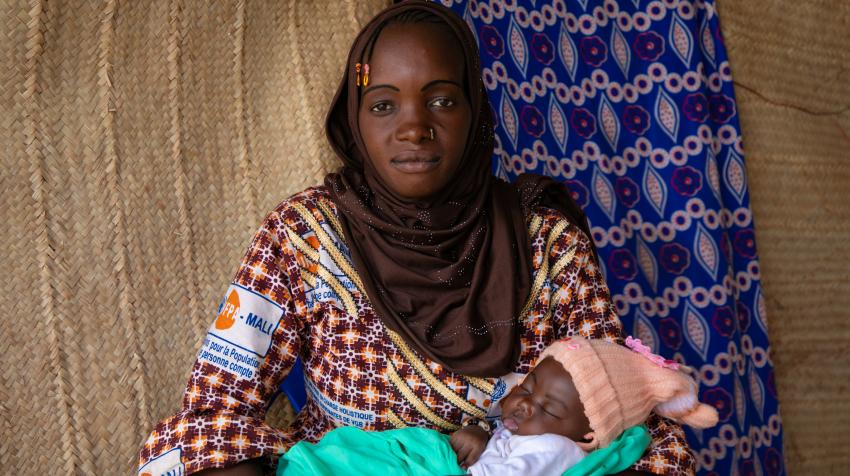When the United Nations General Assembly adopted the Millennium Declaration in 2000, the goals and targets it set in the section on development ultimately became known as the Millennium Development Goals. However, the MDGs were not part of a new agenda, but an attempt to refocus years of debate, efforts and struggle to advance the economic and social development of the world's poorest nations.
Reducing poverty and hunger, achieving universal primary education and promoting gender equality have always been at the forefront of the United Nations development agenda. The Assembly had over the years considered these and other related development issues individually or in combination, and had launched several campaigns to address them. However, the MDGs represented a more concentrated attempt to bring together all those activities, undertakings and initiatives in a common focus, underlining their inter-relationships and the need to make progress on all of them in order to succeed in any one of them.
Development first became a central theme for United Nations action in 1960, when the Organization admitted 17 new members, the most in any one year. This was the first wave of newly independent countries that would dramatically change the composition of UN membership. The most urgent developmental concern at that time was reducing world hunger. The Food and Agriculture Organization of the United Nations (FAO) led international action to address the situation of these new UN members from Africa, parts of Asia, and the Pacific and the Caribbean, as well as that of other members in similar situations, by launching on 1 July 1960 the "Freedom from Hunger" Campaign, which drew world attention to the problem of hunger, seeking support from Governments and non-governmental organizations (NGOs) for national campaigns against hunger.
Persuaded that a more concerted action was needed, the General Assembly, on 27 October 1960 [resolution 1714 (XVI)], invited FAO to work out procedures for making available the largest practicable quantities of surplus food to help fight hunger in the least developed countries (LDCs). However, it did assert that the ultimate solution to hunger lay in an effective speeding-up of economic development. To deliver on the resolution's objectives, the Assembly, on 19 December 1961 [resolution 1714 (XVI)], established the World Food Programme (WFP) on a three-year experimental basis, with a voluntary fund of $100 million. The Programme, to be administered jointly by the United Nations and FAO, would be supported by a pledging conference to take place each year at UN Headquarters in New York. On 15 December [resolution 1521 (XV)], the Assembly also decided to establish the United Nations Capital Development Fund as an additional mechanism for addressing the capital-development needs of the LDCs.
Recognizing that the problem was much wider than just hunger, the Assembly on 19 December 1961 [resolution 1710 (XVI)], on a proposal by the President of the United States, proclaimed the 1960s as the "United Nations Development Decade". During the Decade, developing countries would set their own targets, of a minimum annual growth rate of 5 per cent of aggregate national income. The Assembly also called for accelerated measures to eliminate illiteracy, hunger and disease. To ensure that any international campaign that addressed development reflected their own concerns and perspectives, developing countries organized the Conference on the Problems of Economic Development, from 9 to 18 July 1962 in Cairo, Egypt (then known as United Arab Republic). After the Cairo Declaration of Developing Countries was adopted, on 18 December, the Assembly recommended that the United Nations system take into account the principles of the Declaration when dealing with economic and social development questions of developing countries.
To reinforce the goals of the Decade, the Assembly [resolution 1943 (XVIII)], on 11 December 1963, appealed for support for a World Campaign against Hunger, Disease and Ignorance, to be carried out by NGOs in the second half of the Decade. It established, on 30 December 1964 [resolution 1995 (XIX)], the United Nations Conference on Trade and Development (UNCTAD) to promote market opportunities for primary commodity exports; and in 1965, the United Nations Development Programme (UNDP), through the merger of the Expanded Programme for Technical Assistance -- set up in 1950 to provide technical advisory services and training opportunities for developing countries -- and the United Nations Special Fund, created in 1959 to assist them in widening their productive capabilities; and the United Nations Industrial Development Organization (UNIDO).
The development goal of reducing hunger was also supported by His Holiness Pope Paul VI, who, advocating on behalf of the world's poor and hungry, told the Assembly on 4 October 1965 that its "task was to ensure that there is enough bread on the table of mankind". In the same year, the Assembly [resolution 2095 (XX)] extended the World Food Programme on a continuing basis, setting a target of $275 million for voluntary contributions during 1966-1968 and asked the FAO Executive Director [resolution 2096(XX)] to study and propose means and policies for large-scale international action for combating hunger effectively. On the basis of that study, prepared in cooperation with UNCTAD, the World Bank and the International Monetary Fund, the Assembly in 1968 [resolution 2462 (XXIII)] called on WFP to cooperate with other interested organizations in further adapting multilateral food aid to meet rising needs. As a result, in 1969, WFP exceeded for the first time the pledging target of $200 million, reaching $265 million.
Despite these efforts, the UN Secretary-General acknowledged at the midpoint assessment of the First Development Decade that only limited progress had been made, with ultimate goals still distant. In the light of that failure and in recognition of the growing needs of the developing countries, the Assembly on 24 October 1970, on the occasion of the twenty-fifth anniversary of the United Nations, proclaimed the Second United Nations Development Decade, starting from 1 January 1971. On this occasion, it adopted [resolution 2626 (XXV)] the International Development Strategy as a means of achieving the Decade's goals. Its important features were the call for a major part of financial resource transfers to developing countries to be provided in the form of official development assistance (ODA), that developed countries should provide such assistance to a minimum level of 0.7 per cent of their gross domestic product (GDP) by the middle of the Decade, and the provision of special measures for the least developed among developing countries. However, implementation of the Second Development Decade would be severely tested by the turn of events in the years ahead. In 1971, the world was plunged into crisis by the collapse of the Gold Standard to which several currencies were pegged. The effect of that event on oil prices and the resulting inflationary trend were further aggravated by the start of the Yom Kippur war between Israel and the Arab States in 1973, the subsequent oil embargo imposed by some members of the Organization of Petroleum Exporting Countries (OPEC) and the slump of world commodity prices in 1974.
Responding to the deteriorating external economic environment of worldwide inflation, the scarcity of food, the adverse turn in developing countries' balance-of-payments, the recession in the developed market economies and the depressed trade prospects of developing countries, the Assembly, acting on a proposal by the United States, convened the World Food Conference from 5 to 16 November 1974 in Rome, Italy. The Conference adopted the Universal Declaration on the Eradication of Hunger and Malnutrition, which recognized that the food crisis had implications not only for economic and social development but also for the fundamental principles and values associated with the right to life and human dignity, as enshrined in the 1948 Universal Declaration of Human Rights. It therefore proposed the establishment of a World Food Council to coordinate the activities of international agencies in agriculture and concluded a global undertaking on food security, based on a system of nationally held cereal reserves. On 17 December, the Assembly set up the World Food Council and asked the Secretary-General to convene a meeting to work out the details of an international fund for agricultural development.
The Assembly's mid-term review in 1975 of the implementation of the International Development Strategy of the Second Development Decade took place in a changed international economic order, the foundations of which had been shaken by the economic events in the first half of the 1970s. Developing countries emerged from that situation as a more powerful factor, leading to their call for a new international economic order. That call was articulated by Algerian President Houari Boumediene on behalf of the Non-Aligned Countries -- those States that considered themselves not formally in alliance with or against any major power bloc -- in his request for a special Assembly meeting to consider an item, "Study of the problem of raw materials and development". These countries viewed the International Development Strategy for the Second Development Decade as having failed for several reasons, including a lack of political will by developed countries to take urgent action.
The General Assembly therefore convened its sixth special session on 9 April 1974, during which it adopted the Declaration of the Establishment of a New International Economic Order [resolution 3201 (S-VI)] that listed 20 principles on which the new order should be founded. It also adopted the Programme of Action [resolution 3202 (S-VI)], which contained proposals for reforming the international monetary system and for financing the development objectives of developing countries. Also adopted was a Special Programme of emergency measures to mitigate the difficulties confronting the least developed and landlocked countries affected by the global economic crisis. On 6 December 1974 [resolution 3281 (XXIX)], the Assembly adopted the Charter of Economic Rights and Duties of States, which had been initiated by the third session of UNCTAD in 1972.
Since developed countries had not, by and large, implemented the policy measures of the International Development Strategy, the General Assembly on 5 December 1980 [resolution 35/36] adopted the New Development Strategy for the Third United Nations Development Decade (1981-1990), setting out goals and objectives for the 1980s and policy measures for their implementation, supplementing and extending those of the Second Development Decade. It laid out a number of important targets to be reached by 1990: growth rates for developing countries of 7.5 per cent of GDP and 8 per cent for exports; gross investment at 28 per cent and gross domestic savings at 24 per cent of GDP; concessional financing to reach and surpass 0.7 per cent of GDP of developing countries; the reduction and elimination of poverty; a significant reduction of mortality rates; international structural change, including the early establishment of the new international economic order; and changes in international institutions and mechanisms. In a review and appraisal of the Third Development Decade in 1984, the Assembly stated that ten years after the call for a new international economic order, no progress had been made towards its establishment. Moreover, the targets set for the Third Decade had not been met.
By 1990, the gap between developed and developing countries continued to widen. Living conditions and prospects for growth in developing countries deteriorated and their position in international trade and finance weakened substantially. It was against this worsening background that the Assembly, at its special session in 1990, adopted the Declaration on International Economic Cooperation, in particular the revitalization of economic growth and development of developing countries, which, it stated, was the most important challenge of the 1990s for those countries. It also proclaimed the Fourth United Nations Development Decade (1991-2000) and adopted the International Development Strategy for the Decade, which sought to ensure that the 1990s would witness the accelerated development of developing countries. The implementation of the Decade was supported by a number of related actions: the Second United Nations Conference on the Least Developed Countries (3 and 4 September 1990), which adopted the Paris Declaration and a Programme of Action for the Least Developed Countries; the Global Conference on the Sustainable Development of Small Island Developing States (April/May 1994), which adopted the Declaration of Barbados and a Programme of Action for the Sustainable Development of Small Island Developing States; and the World Summit for Social Development (6 to 12 March 1995), which adopted the Copenhagen Declaration on Social Development and the Programme of Action for the World Summit. More importantly, the Assembly held world hearings on development in New York in June 1994. These expert consultations on the elaboration of a UN agenda for development had been proposed by the Secretary-General in 1992 as an integrated approach to the wide-ranging economic and social issues dealt with by the United Nations.
Despite the momentum gained in addressing the developmental challenges of the 1990s through numerous conferences, consultations, declarations and strategies, new challenges emerged to thwart such efforts. These included the outbreak of several armed conflicts in Africa, the Americas and Eastern Europe, requiring large UN peacekeeping and humanitarian operations and, following the democratic changes in Eastern Europe, the increasing need for additional development assistance to meet the requirements not only of developing countries but also for the new transition economies. In addition, the world economy was slow to recover from the aftermathnd the uncertainties related to the Brazilian economy. The United Nations therefore had to reshape its development thrust accordingly. In that context, in June 1997, the Assembly adopted the Agenda for Development [resolution 51/240], a comprehensive document underlining the multidimensional undertaking of achieving a higher standard of life for all, encompassing all the different aspects and related elements of development, such as peace, economic growth, environmental protection, social justice and democracy. The Agenda was the first integrated focus on development. The Assembly also gave special attention to poverty, proclaiming in December 1997 [resolution 52/193] the First United Nations Decade for the Eradication of Poverty (1997-2006). Its overarching goal was the eradication of absolute poverty and the substantial reduction of poverty in the world. In 1996, the International Year against Poverty, proclaimed by the Assembly in 1993, was observed.
Towards the end of the 1990s, developing countries had taken steps to liberalize their economies and integrate them into the world economy. Against that backdrop, international attention was focused on the benefits of globalization and the growing interdependence in the world economy. In September 1998, the Assembly held a special two-day, high-level dialogue to examine the social and economic impact of globalization as it related to strengthening international cooperation for development. In 1999, a review of the Decade revealed that development progress had been mixed, with many challenges remaining. Economic growth, by itself, was no longer a sufficient factor of development. The focus had shifted to a number of institutional preconditions for development, including good governance, transparency and accountability, decentralization and participation, and social security.
The 2000 Millennium Declaration sought to combine these numerous efforts to address poverty and economic and social development in a holistic fashion. Two years later, it was complemented by the International Conference on Financing for Development (March 2002), which adopted the Monterrey Consensus on Financing for Development. It recognized that the 0.7 target for ODA set in 1970 had not been met and called on developed countries that had not done so to redouble their efforts in that regard if the MDGs were to be achieved. The international community is now at the midpoint of the implementation of the Declaration's development goals. While some parts of the world are well advanced in meeting the MDGs, overall implementation is lagging. The various development decades and strategies should be seen not as failures but as incremental steps in the long struggle to address the intractable problem of development and as a sustained attempt by the United Nations to readjust to the dynamics of an ever-changing international environment and to situate the problem in its wider context.
The UN Chronicle is not an official record. It is privileged to host senior United Nations officials as well as distinguished contributors from outside the United Nations system whose views are not necessarily those of the United Nations. Similarly, the boundaries and names shown, and the designations used, in maps or articles do not necessarily imply endorsement or acceptance by the United Nations.



